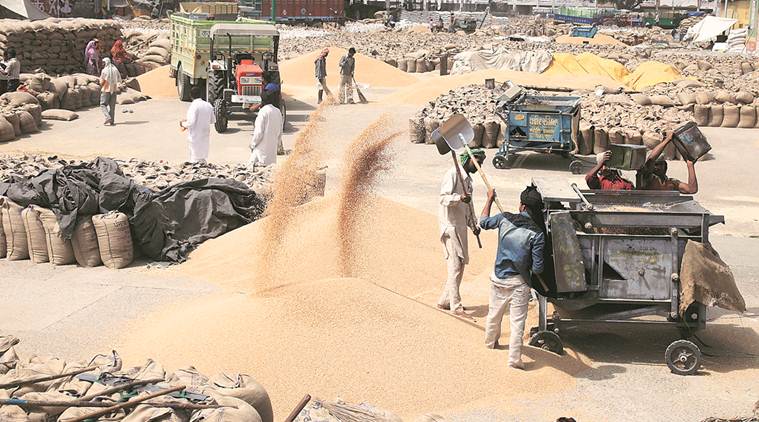 Wheat growers have been promised Rs 265 over and above the MSP of Rs 1,735 per quintal. (Express file photo)
Wheat growers have been promised Rs 265 over and above the MSP of Rs 1,735 per quintal. (Express file photo)
Frustrated by the long wait to sell his produce of chana, a farmer stormed into the mandi office here last week and threatened: “If I am not able to sell my crop on Monday, I will set it afire here.’’ The threat, which came against the backdrop of a farmer’s death at the mandi as he waited to sell his produce, jolted the officials into action. They had a tough time pacifying the farmer.
With hundreds of farmers waiting outside mandis in temperatures above 40 degree Celsius to sell their produce of chana, lentil and mustard to the government, scenes like these are becoming common across Madhya Pradesh. Chief Minister Shivraj Singh Chouhan on Thursday asked Collectors to take steps to reduce delays at mandis. The Collectors have been told to ensure that limited number of farmers are called to the mandis so that there are no queues. BJP’s Kisan Morcha on Thursday asked its members to reach mandis and offer cold drinking water to the waiting farmers from May 25 to June 15.
The BJP government’s direction came a day after the Congress asked its workers to reach mandis and procurement centres and interact with farmers. Alleging that farmers are dying in the state due to firing, high debts, farm losses and now waiting to sell their crops, state Congress chief Kamal Nath has said the state government claims to be pro-farmer but they are the ones to suffer the most.
The long queues at mandis and procurement centres follow the government’s decision to buy wheat, gram, mustard and lentil directly from the farmers. The procurement of wheat began on March 15 and will continue till May 26 while purchase of chana, mustard and lentil began on April 10 and will continue till June 9. As of Thursday, the state government has procured 9.79 lakh MT chana, the highest ever in the country, and 70.58 lakh MT wheat.
Wheat growers have been promised Rs 265 over and above the MSP of Rs 1,735 per quintal. The MSPs for chana, mustard and lentil are Rs 4,400, Rs 4,250 and Rs 4,000, respectively. Shortage of weighing machines and porters is aggravating the situation because only a limited number of trolleys can be weighed at the smaller mandis like the one at Lateri.
Most mandis are not equipped with a weighbridge that can quickly weigh a loaded and unloaded trolley to determine the produce. The current process involves emptying a trolley on ground, distributing the content in sacks, weighing them and sealing them. It takes up to 80 minutes to weigh a 40-quintal trolley. After the death of the farmer last week, the Lateri Mandi increased the number of weighing scales but they are still proving inadequate to cater to the rush.
Lateri, one of the smaller mandis, caters to 10,000 farmers living in a radius of 35 km. Once the farmers reach the mandi, before their turn or after, they don’t go back home so that they save on diesel or rent of tractor-trolleys. Also, they have no option but to sell to the government because traders are offering much less. The farmers, however, said that if they sell to traders, they get the money immediately, but the proceeds from selling to the government is deposited after some days.
“We are angry with the government. We need money on time. No point getting something extra when the need is over,’’ said Babu Khan, a farmer from Lateri, when asked about the extra money he will get by selling his produce to the government. Mandi officials, on the other hand, said the farmers either come before the due date or later and insist on selling their produce immediately. “Even when they are told to go home and come at a later scheduled date, they don’t go. This makes things unmanageable,’’ said mandi official Vishwanath Dhamde.